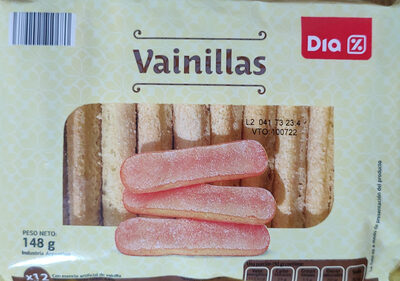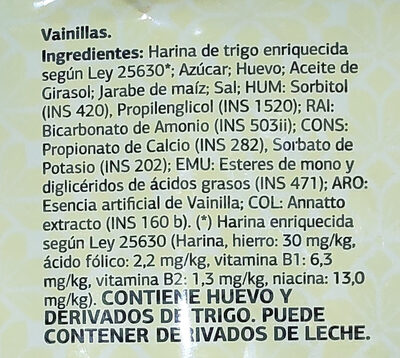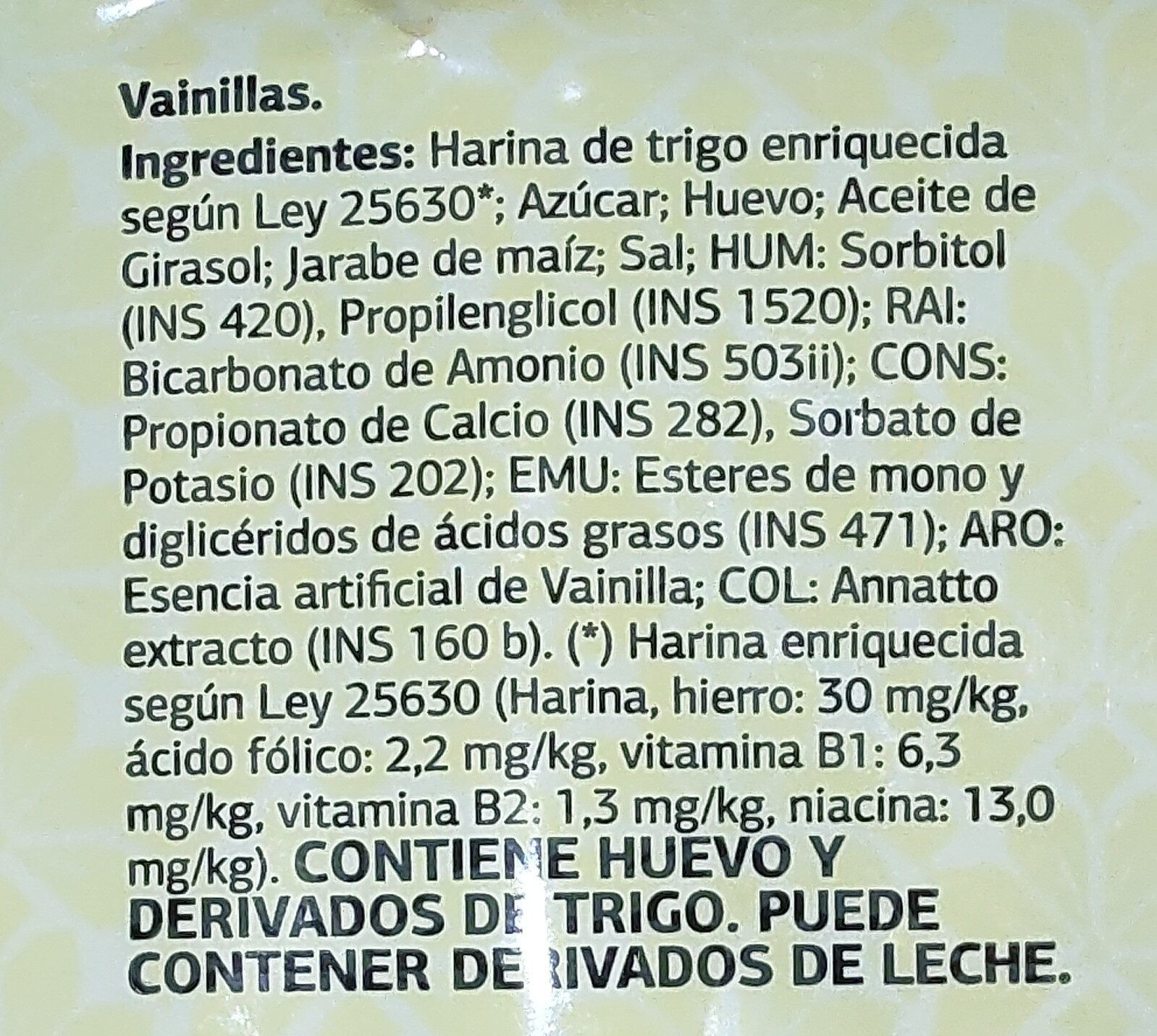Help us make food transparency the norm!
As a non-profit organization, we depend on your donations to continue informing consumers around the world about what they eat.
The food revolution starts with you!
Vainillas - Dia - 148 g
Vainillas - Dia - 148 g
This product page is not complete. You can help to complete it by editing it and adding more data from the photos we have, or by taking more photos using the app for Android or iPhone/iPad. Thank you!
×
Barcode: 8480017242983 (EAN / EAN-13)
Quantity: 148 g
Brands: Dia
Categories: Snacks, Sweet snacks, Biscuits and cakes, Biscuits, Dry biscuits, Sponge fingers biscuit
Origin of ingredients: Argentina
Traceability code: RNE 02-032.203
Stores: Supermercados Dia
Countries where sold: Argentina
Matching with your preferences
Health
Ingredients
-
25 ingredients
: Harina de trigo enriquecida según Ley 25630 (harina de trigo, hierro, ácido fólico, vitamina B1, vitamina B2, niacina), Azúcar; Huevo; Aceite de Girasol; Jarabe de maíz; Sal; humectante: (INS 420, INS 1520); regulador de acidez: (INS 503ii); conservante: (INS 282, INS 202); Emulsionante (INS 471); Aroma (Esencia artificial de Vainilla); Colorante: (INS 160b)Allergens: Eggs, Gluten
Food processing
-
Ultra processed foods
Elements that indicate the product is in the 4 - Ultra processed food and drink products group:
- Additive: E160b - Annatto
- Additive: E420 - Sorbitol
- Additive: E471 - Mono- and diglycerides of fatty acids
- Ingredient: Colour
- Ingredient: Emulsifier
- Ingredient: Flavouring
- Ingredient: Humectant
Food products are classified into 4 groups according to their degree of processing:
- Unprocessed or minimally processed foods
- Processed culinary ingredients
- Processed foods
- Ultra processed foods
The determination of the group is based on the category of the product and on the ingredients it contains.
Additives
-
E202 - Potassium sorbate
Potassium sorbate (E202) is a synthetic food preservative commonly used to extend the shelf life of various food products.
It works by inhibiting the growth of molds, yeast, and some bacteria, preventing spoilage. When added to foods, it helps maintain their freshness and quality.
Some studies have shown that when combined with nitrites, potassium sorbate have genotoxic activity in vitro. However, potassium sorbate is generally recognized as safe (GRAS) by regulatory authorities.
-
E282 - Calcium propionate
Calcium propanoate: Calcium propanoate or calcium propionate has the formula Ca-C2H5COO-2. It is the calcium salt of propanoic acid.Source: Wikipedia
-
E420 - Sorbitol
Sorbitol: Sorbitol --, less commonly known as glucitol --, is a sugar alcohol with a sweet taste which the human body metabolizes slowly. It can be obtained by reduction of glucose, which changes the aldehyde group to a hydroxyl group. Most sorbitol is made from corn syrup, but it is also found in nature, for example in apples, pears, peaches, and prunes. It is converted to fructose by sorbitol-6-phosphate 2-dehydrogenase. Sorbitol is an isomer of mannitol, another sugar alcohol; the two differ only in the orientation of the hydroxyl group on carbon 2. While similar, the two sugar alcohols have very different sources in nature, melting points, and uses.Source: Wikipedia
-
E471 - Mono- and diglycerides of fatty acids
Mono- and diglycerides of fatty acids (E471), are food additives commonly used as emulsifiers in various processed foods.
These compounds consist of glycerol molecules linked to one or two fatty acid chains, which help stabilize and blend water and oil-based ingredients. E471 enhances the texture and shelf life of products like margarine, baked goods, and ice cream, ensuring a smooth and consistent texture.
It is generally considered safe for consumption within established regulatory limits.
-
E503 - Ammonium carbonates
Ammonium carbonate: Ammonium carbonate is a salt with the chemical formula -NH4-2CO3. Since it readily degrades to gaseous ammonia and carbon dioxide upon heating, it is used as a leavening agent and also as smelling salt. It is also known as baker's ammonia and was a predecessor to the more modern leavening agents baking soda and baking powder. It is a component of what was formerly known as sal volatile and salt of hartshorn.Source: Wikipedia
-
E503ii - Ammonium hydrogen carbonate
Ammonium carbonate: Ammonium carbonate is a salt with the chemical formula -NH4-2CO3. Since it readily degrades to gaseous ammonia and carbon dioxide upon heating, it is used as a leavening agent and also as smelling salt. It is also known as baker's ammonia and was a predecessor to the more modern leavening agents baking soda and baking powder. It is a component of what was formerly known as sal volatile and salt of hartshorn.Source: Wikipedia
Ingredients analysis
-
May contain palm oil
Ingredients that may contain palm oil: E471
-
Non-vegan
Non-vegan ingredients: EggSome ingredients could not be recognized.
We need your help!
You can help us recognize more ingredients and better analyze the list of ingredients for this product and others:
- Edit this product page to correct spelling mistakes in the ingredients list, and/or to remove ingredients in other languages and sentences that are not related to the ingredients.
- Add new entries, synonyms or translations to our multilingual lists of ingredients, ingredient processing methods, and labels.
If you would like to help, join the #ingredients channel on our Slack discussion space and/or learn about ingredients analysis on our wiki. Thank you!
-
Vegetarian status unknown
Unrecognized ingredients: Iron, Folic acid, Thiamin, es:esencia-artificial-de-vainillaSome ingredients could not be recognized.
We need your help!
You can help us recognize more ingredients and better analyze the list of ingredients for this product and others:
- Edit this product page to correct spelling mistakes in the ingredients list, and/or to remove ingredients in other languages and sentences that are not related to the ingredients.
- Add new entries, synonyms or translations to our multilingual lists of ingredients, ingredient processing methods, and labels.
If you would like to help, join the #ingredients channel on our Slack discussion space and/or learn about ingredients analysis on our wiki. Thank you!
-
Details of the analysis of the ingredients
We need your help!
Some ingredients could not be recognized.
We need your help!
You can help us recognize more ingredients and better analyze the list of ingredients for this product and others:
- Edit this product page to correct spelling mistakes in the ingredients list, and/or to remove ingredients in other languages and sentences that are not related to the ingredients.
- Add new entries, synonyms or translations to our multilingual lists of ingredients, ingredient processing methods, and labels.
If you would like to help, join the #ingredients channel on our Slack discussion space and/or learn about ingredients analysis on our wiki. Thank you!
: Harina de trigo enriquecida según Ley 25630, harina de trigo, hierro, ácido fólico, vitamina B1, vitaminas, vitamina B2, niacina, Azúcar, Huevo, Aceite de Girasol, Jarabe de maíz, Sal, humectante (e420), e1520, regulador de acidez (), conservante (e282), e202, Emulsionante (e471), Aroma (Esencia artificial de Vainilla), Colorante ()- Harina de trigo enriquecida según Ley 25630 -> es:harina-de-trigo-enriquecida-segun-ley-25630 - vegan: yes - vegetarian: yes - ciqual_proxy_food_code: 9410 - percent_min: 4.76190476190476 - percent_max: 100
- harina de trigo -> en:wheat-flour - vegan: yes - vegetarian: yes - ciqual_proxy_food_code: 9410 - percent_min: 0 - percent_max: 50
- hierro -> en:iron - percent_min: 0 - percent_max: 33.3333333333333
- ácido fólico -> en:folic-acid - percent_min: 0 - percent_max: 25
- vitamina B1 -> en:thiamin - percent_min: 0 - percent_max: 20
- vitaminas -> en:vitamins - vegan: yes - vegetarian: yes - percent_min: 0 - percent_max: 16.6666666666667
- vitamina B2 -> en:e101 - vegan: maybe - vegetarian: yes - percent_min: 0 - percent_max: 14.2857142857143
- niacina -> en:e375 - vegan: maybe - vegetarian: maybe - percent_min: 0 - percent_max: 12.5
- Azúcar -> en:sugar - vegan: yes - vegetarian: yes - ciqual_proxy_food_code: 31016 - percent_min: 0 - percent_max: 11.1111111111111
- Huevo -> en:egg - vegan: no - vegetarian: yes - ciqual_food_code: 22000 - percent_min: 0 - percent_max: 10
- Aceite de Girasol -> en:sunflower-oil - vegan: yes - vegetarian: yes - from_palm_oil: no - ciqual_food_code: 17440 - percent_min: 0 - percent_max: 9.09090909090909
- Jarabe de maíz -> en:corn-syrup - vegan: yes - vegetarian: yes - ciqual_proxy_food_code: 31089 - percent_min: 0 - percent_max: 8.33333333333333
- Sal -> en:salt - vegan: yes - vegetarian: yes - ciqual_food_code: 11058 - percent_min: 0 - percent_max: 0.633
- humectante -> en:humectant - percent_min: 0 - percent_max: 0.633
- e420 -> en:e420 - vegan: yes - vegetarian: yes - percent_min: 0 - percent_max: 0.633
- e1520 -> en:e490 - vegan: yes - vegetarian: yes - percent_min: 0 - percent_max: 0.633
- regulador de acidez -> en:acidity-regulator - percent_min: 0 - percent_max: 0
- conservante -> en:preservative - percent_min: 0 - percent_max: 0
- e282 -> en:e282 - vegan: yes - vegetarian: yes - percent_min: 0 - percent_max: 0
- e202 -> en:e202 - vegan: yes - vegetarian: yes - percent_min: 0 - percent_max: 0
- Emulsionante -> en:emulsifier - percent_min: 0 - percent_max: 0
- e471 -> en:e471 - vegan: maybe - vegetarian: maybe - from_palm_oil: maybe - percent_min: 0 - percent_max: 0
- Aroma -> en:flavouring - vegan: maybe - vegetarian: maybe - percent_min: 0 - percent_max: 0
- Esencia artificial de Vainilla -> es:esencia-artificial-de-vainilla - percent_min: 0 - percent_max: 0
- Colorante -> en:colour - percent_min: 0 - percent_max: 0
Nutrition
-
Missing data to compute the Nutri-Score
Missing nutrition facts
⚠ ️The nutrition facts of the product must be specified in order to compute the Nutri-Score.Could you add the information needed to compute the Nutri-Score? Add nutrition facts
-
Nutrient levels
-
Fat in moderate quantity (4.33%)
What you need to know- A high consumption of fat, especially saturated fats, can raise cholesterol, which increases the risk of heart diseases.
Recommendation: Limit the consumption of fat and saturated fat- Choose products with lower fat and saturated fat content.
-
Saturated fat in low quantity (0%)
What you need to know- A high consumption of fat, especially saturated fats, can raise cholesterol, which increases the risk of heart diseases.
Recommendation: Limit the consumption of fat and saturated fat- Choose products with lower fat and saturated fat content.
-
Salt in moderate quantity (0.633%)
What you need to know- A high consumption of salt (or sodium) can cause raised blood pressure, which can increase the risk of heart disease and stroke.
- Many people who have high blood pressure do not know it, as there are often no symptoms.
- Most people consume too much salt (on average 9 to 12 grams per day), around twice the recommended maximum level of intake.
Recommendation: Limit the consumption of salt and salted food- Reduce the quantity of salt used when cooking, and don't salt again at the table.
- Limit the consumption of salty snacks and choose products with lower salt content.
-
-
Nutrition facts
Nutrition facts As sold
for 100 g / 100 mlAs sold
per serving (2 vainillas 30 g)Compared to: Sponge fingers biscuit Energy 1,610 kj
(383 kcal)483 kj
(115 kcal)+2% Fat 4.33 g 1.3 g +12% Saturated fat 0 g 0 g -100% Trans fat 0 g 0 g -100% Carbohydrates 76.7 g 23 g - Sugars ? ? Fiber 2.33 g 0.7 g +74% Proteins 6.67 g 2 g -12% Salt 0.633 g 0.19 g +165% Fruits‚ vegetables‚ nuts and rapeseed‚ walnut and olive oils (estimate from ingredients list analysis) 0 % 0 %
Environment
-
Eco-Score C - Moderate environmental impact
⚠ ️Select a country in order to include the full impact of transportation.The Eco-Score is an experimental score that summarizes the environmental impacts of food products.→ The Eco-Score was initially developped for France and it is being extended to other European countries. The Eco-Score formula is subject to change as it is regularly improved to make it more precise and better suited to each country.Life cycle analysis
-
Average impact of products of the same category: B (Score: 73/100)
Category: Biscuit (cookie), sponge fingers or Lady fingers
Category: Biscuit (cookie), sponge fingers or Lady fingers
- PEF environmental score: 0.32 (the lower the score, the lower the impact)
- including impact on climate change: 1.84 kg CO2 eq/kg of product
Stage Impact Agriculture
79.3 %Processing
12.3 %Packaging
3.4 %Transportation
3.5 %Distribution
1.5 %Consumption
0.0 %
Bonuses and maluses
-
Origins of ingredients with a high impact
Malus: -3
Environmental policy: -3
Transportation: 0
Origin of the product and/or its ingredients % of ingredients Impact Argentina 100 %High
-
Missing packaging information for this product
Malus: -15
⚠ ️ The information about the packaging of this product is not filled in.⚠ ️ For a more precise calculation of the Eco-Score, you can modify the product page and add them.
If you are the manufacturer of this product, you can send us the information with our free platform for producers.
Eco-Score for this product
-
Impact for this product: C (Score: 55/100)
Product: Vainillas - Dia - 148 g
Life cycle analysis score: 73
Sum of bonuses and maluses: -18
Final score: 55/100
-
Carbon footprint
-
Equal to driving 1.0 km in a petrol car
184 g CO² per 100g of product
The carbon emission figure comes from ADEME's Agribalyse database, for the category: Biscuit (cookie), sponge fingers or Lady fingers (Source: ADEME Agribalyse Database)
Stage Impact Agriculture
71.9 %Processing
13.6 %Packaging
6.0 %Transportation
7.4 %Distribution
1.1 %Consumption
0.0 %
Packaging
-
Missing packaging information for this product
⚠ ️ The information about the packaging of this product is not filled in.Take a photo of the recycling information Take a photo of the recycling information
Transportation
-
Origins of ingredients
Origins of ingredients with a high impact
Origin of the product and/or its ingredients % of ingredients Impact Argentina 100 %High
Report a problem
-
Incomplete or incorrect information?
Category, labels, ingredients, allergens, nutritional information, photos etc.
If the information does not match the information on the packaging, please complete or correct it. Open Food Facts is a collaborative database, and every contribution is useful for all.
Data sources
Product added on by flipwared
Last edit of product page on by flipwared.
Product page also edited by ecoscore-impact-estimator, openfoodfacts-contributors.










